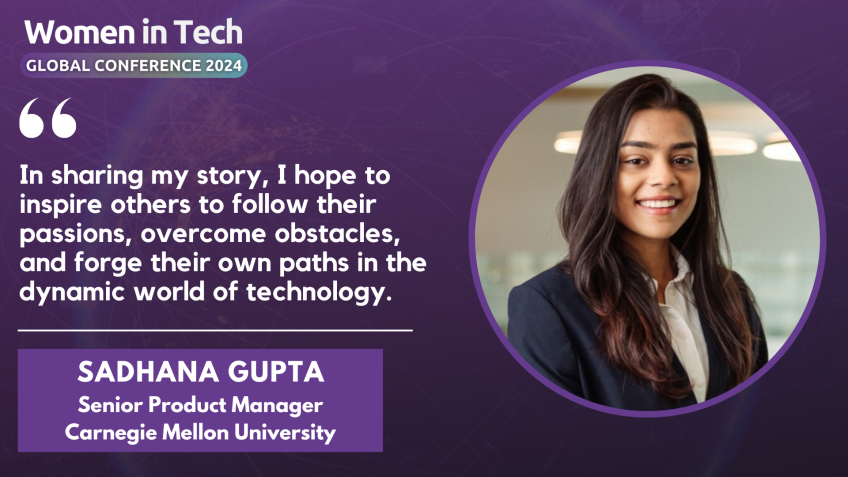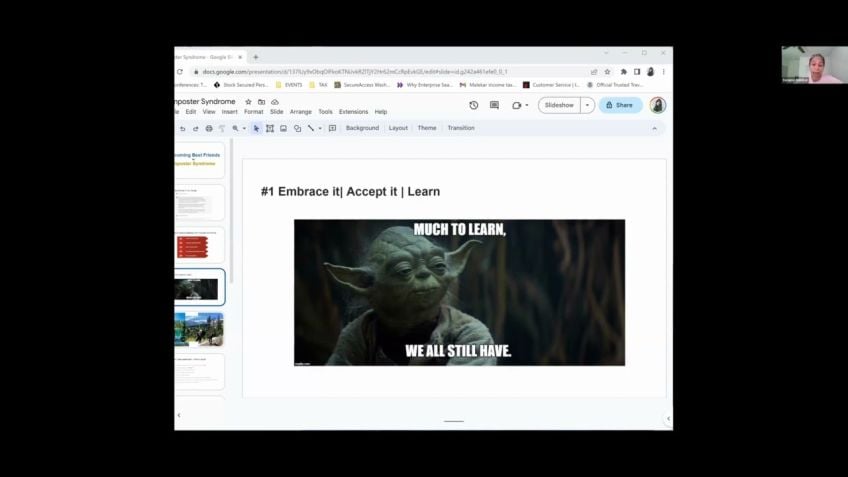Managing Impostor Syndrome and Self-Doubt by Ronke Majekodunmi Beth Hayden
Conquering Imposter Syndrome: A Conversation with Rocky Kadumi
Welcome to today's insightful discussion on imposter syndrome. Joining me today is Rocky Kadumi, a remarkable leader in product management who has dedicated her career to creating world-class products and educating the next generation of product leaders.
Who is Rocky Kadumi?
Rocky Kadumi is a powerhouse in product management. Her mission is to make the world of product management more accessible to diverse product makers entering the field. She provides invaluable insights and shares authentic experiences for the next generation to learn from.
Understanding Imposter Syndrome
Rocky shares her personal experience with imposter syndrome, a psychological pattern in which an individual doubts their accomplishments or talents and has a persistent internalized fear of being exposed as a "fraud".
"Imposter Syndrome feels like I'm not good enough. No matter what I have accomplished, it's just never enough. It's a constant feeling that when I'm in a room full of people, I don't belong there, I'm not smart enough to be there.
It's always there for me, in that mindset no matter what it is, it's always like, okay, well, do I really belong here? It’s exhausting after a while."
Recognizing Imposter Syndrome
Ronke identified her imposter syndrome through reading and personal experiences. Notably, overcoming a toxic work relationship and exploring a new romantic relationship made her confront her doubts and insecurities. This self-recognition was crucial in navigating her feelings of inadequacy.
The Causes of Imposter Syndrome
In her experience, the root causes of her imposter syndrome were environmental and stemmed from situations where self-confidence wasn’t fostered. Ronke explained:
"There were multiple things one was my environment, self-confidence wasn't exactly fostered, right? I had to deal with not one, but two toxic work environments. I think those are the causes of it."
Handling Imposter Syndrome
Rocky uses multiple strategies to handle moments of imposter syndrome:
- Remembering her grandmother’s journey: Drawing inspiration from her grandmother's resilience helps ground her when feeling overwhelmed or inadequate.
- Recording her accomplishments: Writing down her achievements gives her a tangible reminder of her abilities and success.
- Reframing anxiety: Turning feelings of anxiety into excitement helps reduce the stress and makes the situation more manageable.
- Not comparing herself to others: Realizing that everyone has their unique journey allows her to focus on her own growth and progress.
Fighting Expectations
Ronke acknowledges that there are often expectations and biases placed on women, including how they should act or communicate. To combat this, she chooses to be her authentic self, refusing to be boxed in by societal norms. Ronke’s advice is clear: run your own race.
Whether you are navigating through the world of product management, finding your footing in a new career or simply seeking inspiration for your personal journey, Ronke Kadumi's story provides invaluable insights.
Video Transcription
Well, welcome everyone. We are so excited to have you all here for this important topic. My name is Beth Hayden. I'm the Chief People Officer for Spot Hero and it is my sincere pleasure to introduce you to one of my favorite people in the entire world.Rocky, Maji Kadumi. Rocky for many years has been, by the way, her pronouns are she her, she's been a noteworthy leader in powerhouse and product management. She has dedicated her career to creating outstanding world class products and investing her time to educate the next generation of product leaders.
Her mission is to make the world of product management more accessible for diverse product makers entering the field, providing insights and authentic experiences for the next generation to draw from. And that's really what why we're here is we're thinking of no matter where you are in your career trajectory. This really important topic of imposter syndrome and feeling like you don't measure up for whatever reason. And from time to time, we've all felt that way and we're here to hopefully convince you you are enough and we have some amazing stories through Ronke lens personally and professionally and with that said, Ron, you ready? I thought we'd just start with um what is imposture syndrome?
What does it feel like?
Uh Thank you so much, Beth. Uh By the way, just to let everybody know Beth is also one of my favorite people in the world and she's my mentor and she's also um the one of the reasons why I'm able to do this um conference today. So thank you so much for always supporting me. Um And also thank you women in women in Tech Global for having me today. So what does that feel like? It feels like I'm not good enough. That's what it feels like. It feels like no matter what I have accomplished, it's just never enough. I feel like I don't work harder, like I, I have to work even harder. And it's just that feeling like when I'm in a room with people, I feel like I'm a fraud and people are going to find out that I don't belong there. I'm not smart enough to be there. It's, it's that it's always, it's always there for me, right? In that mindset matter what it is, it's always like, ok, well, do I really belong here? Do I know what I'm doing? I have to triple check things, right? And as a product manager, it's even more pronounced, right? Because when I started out as a product manager, there was in private school that was in all these other resources that there were, so how do you really know you were doing well? Right.
And um it was just, it's just always that feeling like, oh my God, I don't know if I can make it. So
and just to dive a little deeper on that, maybe describe a scenario where you felt this show up. Oh, my dog has joined us. This is better in the
well, welcome, welcome. Um Oh man, in my professional life, um whenever we would successfully release a feature, a product, you name it and I would celebrate with the team. But deep down, I'm always thinking what if it's not, you know, this is just a fluke, right? People will figure out eventually I'm not a good product manager or I don't know what I'm doing right when I have skip level meetings with leadership, I'm always that those thoughts are there like that comes to my mind is why did they invite me to this meeting? They must know I'm not smart enough to be here, right? Uh I cannot tell you how many times I've been in conference rooms, right? With my colleagues. And I'm always, there's always that thought like someone's gonna come in and tap me on the shoulder and say, yeah, you don't belong here. You're a fraud. We figured you out. Um Those are the way it manifested in my, in my professional life. The constant feeling like I have to work twice as hard. I have to work harder. And of course, that's the thing, right? When you work harder, it's never enough because you always feel like you're not working hard enough and it's just exhausting after a while. So,
so when did you come to the conclusion that this was imposter syndrome for you?
So, um I started to do well, first I started to do a lot of reading. Um That's one and two, there were just a couple of things that were happening personally that I had to deal with. Uh one was, um I met this incredible man, right? And I was used to not have a functional relationship, you know, with boyfriends. So he kind of came along and I kind of thought, well, that's just weird. This is not real, right? And so no matter how it started with that really where I kind of had to go. OK, I have to stop this where I literally would question um our relationship, right? The first time we ever met, um it was we met online, but the first time we actually ever talked was via video chat. And I remember five minutes into the conversation, I looked at him and I said, you do understand, I'm not skinny, right? And he looks into the camera and he looks at me and he goes, I saw your pictures. Um I'm good. Um But it's, but, but even after that, right, it was there, it was always there in the back of my mind, we would go out to dinner or whatever. I'm always like, why, you know, why is this man incredibly good looking man with me? Right.
And eventually, um as our relationship kind of progressed, I realized I needed to deal with that because I didn't want to. Honestly, it was just this thought one day that came to me that 30 years from now when I'm married to this man and we're old. I don't want to think back to the early stages and keep, and remember that I spent most of my time doubting him and doubting our relationship and doubting myself. That was one. The other thing that happened was in my professional life. I had gotten out of a toxic work relationship. Yeah, it was a toxic work relationship. And same thing there. I was sort of dealing with some after effects of that. Some people call it poststress disorder. But same thing there was as I was about to embark on this new journey, working for a new employer. I wanted to again walk in with confidence as a product, as a product leader and not feel like uh I needed to cower somewhere like I didn't belong there. So it was just a series of things. But also I started to do a lot of reading about, about what it is. I googled it actually. And then I'm like, oh, that's what it is. Imposter syndrome. Ok. Let's go, let's go work on that. So that's sort of how it started out for me.
Well, I'm seeing some notes and chat where you're resonating and this is relatable and people are feeling the self doubt and um I like the comment about being weird. There's a book called Weird that I love it. Relevant. Uh So, so you talked a little bit about professional and personal, which I find really interesting. This isn't limited to feeling like this or doubting yourself only in the professional environment. What, what causes imposter syndrome?
Oh, great question. So for me, for me anyway, and I don't know, I mean, everybody's experience is different, obviously. So for me, there were multiple things, one was my environment, right? So I think I kind of came from an environment where self confidence wasn't exactly fostered, right?
Um Where if I got a b then it's like, why didn't you get an A? Right? That was always there since high school, right? Where, you know, so those were there, right? So if I, I, so my environment kind of made me feel like I didn't, I wasn't good enough, right? So then that kind of carried on to further into my twenties, right? Um So it started there and then I've had like I said, not one but two toxic work environment where I've had to honestly, do you know, I really try to figure out, OK, do I really want to keep working in this kind of environment where nothing I do is ever good enough. And that's for me, I think those are the causes of it. And also the other thing I wanted to mention is because the environment fo you know, didn't foster self-confidence and you know, being good enough, whether it be. So imagine that person in their twenties now going to work to, to, you know, go into corporate America. Right? So then when you're in a toxic relationship with in corporate America, your instinct is not to leave, right? Your instinct is to stay and try to fix it and try to be better and work twice as hard, basically, literally killing yourself, right? And it doesn't really matter because you're never gonna be good enough right to that person as well.
So it's doing that analysis and trying to figure out and, you know, eventually that got me to kind of go OK, you know what? Even now I'm very picky about the kind of environment I go into work wise. But those to me were the causes, right? It starts there, right? Being a teenager or you know, or you know, or about to graduate high school, not getting a B but it's not an a not being good enough. It kind of starts in that environment and then it it just stays with you.
So yeah, thank you. Thank you for that and, and for sharing so openly, your your journey. I I wanna go for a second to chat on a couple of things that I find really interesting around how this shows up. So one of them is speaking up in meetings and another one is how do you audit your emails? So you don't come across across as bitchy or bossy? So, what do you, what do you think of our chat here?
Yeah. No, I love it. Um, well, actually the other thing too is there also the reverse that of, of apologizing for everything even in emails, right? Which is something that I stopped doing when I first started out. I used to do that. I go, I'm so sorry. It's like I used to go. Can I take a day off? Almost like almost that feeling like I I'm lucky to be here, right? So there's also the reverse of that too. The other part of that is, yes, you're right. I don't want to sound like you're being bitchy either. I write emails where I say hello. I hope you're having a lovely day. Listen, these are my thoughts, my perspective. What do you think? Right. Uh You know, opening that door? Like, what are your thoughts? What do you think? Let me know if you wanna have coffee to have further discussions about this? But I find that usually helps, you know, opening that door but not saying this is the final answer. This is how I feel, but I'm more like, listen, I'm not perfect at this, right? Especially product management. You kind of have to check your ego at the door because you have blind spots and biases as a product manager. And so you want the more diverse thought you have, you know, on the table when you're building a product the better. So that's sort of how I approach that is. I'm not perfect. I have biases. I have blind spots. Let's have this conversation.
Tell me what I'm missing rather than, you know. So it doesn't come across like being bitchy.
Yeah, I, I and I want to explore that more kind of making the the product right? Or the customer and us are the the hero of the story. Instead, I, I love how you talk about that. What, what are some, speaking of, of that, what are some solutions that you've employed when you're encountering these moments of imposter syndrome?
So again, so these are the things that have worked for me. Everybody's different, but I sort of wanted to list them. So the first one is um my grandmother um helped to raise me and my grandmother. Um she was raised by her often, I mean, sorry, she was an, often she was raised by her grandparents. Um I often think about her a lot and the fact that she works so hard to give me the life that I have, right? And how it's important that I give back to the next generation of product leaders. And by the way, that's another reason why I write blogs. I do a lot of what I do because I sort of got to a point in my career when I thought, ok, well, how do I pass this on? Right. You know, at the end of this, when Rocky stops being a product manager, what are people gonna say? What have I done? What lives have I helped to change? Um Even if I only help the trajectory into product a little bit, it's something. So that's one I always think about her a lot. And I gotta tell you every time I think about her a lot. When usually when I'm about to walk into a situation where I'm presenting those fears, go away from me very quickly, then it becomes about that moment and the fact that I need to meet that moment and I need to meet it with a gravity house that, that, that uh that he needs, right?
So that's one, the second thing is I write down my accomplishments. Now, once I realized that I had imposter syndrome, I tried to figure out, OK, how do I when I get when I get into those moments? And I need to do a presentation for my leadership and really talk about who I am and tell my story and the story of my product. I go back and I look at my journal and I kind of go OK, we did this, we did that, we did this. Here's the impact that it had in our customers lives. And I tell those stories. And by the way again, we're all human, so easy to forget once you release something. And that's why I write it down to remind myself the impact, you know, how our product is the hero for our customer, you know, for is the hero internally. But for our customers, they are the hero using it for their organization and telling that story. The third is um anxiety is due to stress, right? For me. So I've learned to turn that anxiety into excitement. And the way I do that is this the worst thing to happen. I always tell myself in a meeting is either the laptop, my laptop drop uh stops working, slack, it shuts down or we don't stop doing it for five minutes due to technical difficulties, it doesn't matter.
But those are the worst things to happen, but I will get through it. I will survive the worst things that are spelling errors in my presentation. It's OK, I'm human, right? But what's important to me is learning from those mistakes because then it makes me a better human being, a better person, a better leader. And I'd rather have that because nobody's perfect once again. Right? I want to learn that fourth is I stopped comparing myself to other people.
I had this colleague. Um who till today is such an awesome person. I still talk to her all the time. And she's just perfect in my eyes. Perfect. I would go to customer visits with her and she would just walk in like she owned the room and she would ask questions, she would chat with them. She would laugh. She always had a list with her ready to go. She was never surprised. And one day we visited a customer in Connecticut, we're heading back to New York on a train and I looked at her and I said to her, I said you are perfect. So I'm like, I don't understand how do you do it? And she looks at me and she goes, oh Rocky, I'm not. She's like, I can, I'm thinking it until I can make it. Just like, and I'm like, wait, what? She's like, oh, I have no idea what I'm doing. She's like, I'm just going by the moment and that day that conversation and same thing, by the way, as the more I talked to her on the train that day, the more I realized that she also came from a similar environment that I came where self-confidence was not fostered. But she along the way, figured out that when she's in those moments, she makes you look like she has it together by faking it until you can make it.
And that conversation changed my life because I realized, oh my God, I've been comparing myself to this woman for months and years thinking she was perfect and I needed to be perfect. I mean, I'm telling you that we would need to, she would say to me, ok, Rocky, we're going to Connecticut. So I'll meet you at Grand Central Station at 745. Right. And I would be there at 730 because I didn't want to disappoint her and I wanted to be there on time and by the way, she strolls in at 750. Right. Um, and I just, that conversation changed my life and I just realized, ok, I've got to stop comparing myself to other people and I need to run my own race. Instead it's imperfect. My story is messy and its brilliance. But man, I love it that way. That is how it's meant to be
amazing. Amazing. I I'm looking at the chat and I wanna either from your grandmother's story or your own, there are expectations placed on women, right? From the media, from our environments, whatever that might mean. Um I'm seeing things like, why don't you smile more or expectations of apologies or um asking for permission, talk a little bit more to our audience about uh how, how you overcome these expectations or, or find ways to meet them in your own unique, authentic way.
So here's the thing, everybody, I've sort of decided to run my own race. Now, uh One of the reviews I recently had was a leader telling me that I smile too much, right? So that I was too happy and that nobody would take me seriously. We got
a scary, a scary emoji
people. I know. Right. Right. I literally had a pro my own. I had a leader to tell me you, you too much. You're too happy. No one's going to take you seriously. And you're not going to be promoted.
It's this double bind, right? For women, you have to be likable and credible and pick one. Right?
Like pick one. right? So it's either you're not smiling or you smell too much. Right? Oh, and now I can't take it seriously because you smile too much. But here's the thing as a product leader, right? If I didn't come in every day and I didn't cheer, I wasn't a cheerleader for my developers. Then the feedback I would get is you're not a people person, right? You're not a leader so you can't win. So I've decided to run my own race and I'm gonna be my authentic self. And if that organization doesn't see it, well, that's fine. Eventually I'll move on and I'll find the right fit. That's sort of where I am right now. And also I'm a little older now, I think in my twenties, I mean, I'm sure in my twenties I've been calling you and go, oh my God. Beth. I said, I smile too much. What should I do? And listen, when I got that feedback at first I thought, oh my God, is this person saying I'm fluff. Like I'm not smart. Like why wouldn't anybody see that? I'm smart. Look at all the features and products. Look at how I lead my team. That was, those were the literally the first thoughts that came into my mind were, oh my God. Like what? Yeah. But after and again, listen, I still deal with it 24 hours later. I'm like, ok, thank you for the feedback. I got to run my own race.
I love run your own race. And I think that's as we, as we draw to our, our time and the bottom of the hour. I, I think it's uh it's such good advice because the perception or the rating of all of us is as much or more about the raider, right? Than it is about you. And I'm so proud of you for coming into your own and, and seeing um seem through that. So for, for everyone that's listening, run your own race. Rocky. You're incredible. It was a great time. I listened to you. I learned something new. You're, you're an inspiration. So thank you so much.
Oh, thank you so much and thank you everybody for attending. Thank you women in tech, women in Tech Global for having me. This was awesome. I'm profoundly grateful for this opportunity to talk about imposter syndrome and self doubt. So, thank you all so much. Thank you, Beth.
Hi, everyone.
Bye.





